Join JPI UE
Faq
FAQ
Please click here for the frequently asked questions we collected.
If you have an additional questions you are welcome to mail us at info@jpi-urbaneurope.eu
The Programme on Positive Energy Districts and Neighbourhoods (PED) has the ambition to develop pathways towards implementation of 100 Positive Energy Districts in urban neighbourhoods across Europe by 2025. This is seen as an important contribution to current policies on achieving the goals of reducing Europe’s carbon footprint, managing the energy transition and to cities ambitions towards sustainable urban development. Solid understanding and consideration of cities’ experiences and strategies serves as the base of developing the programme. This is why the PED Programme aims at a strong involvement of cities, R&I institutions, industry and citizens in the programme implementation.
The PED Programme Cities Workshop on 3 April at Nordbahnhalle in Vienna therefore invited representatives from cities, city networks, research and funding agencies to develop this important topic of urban transition together and lay basis for further cooperation. Aims of the workshop were:
• Discussion of PED framework and cities’ strategies and needs
• Exchange of experiences on PED-related pilot projects
• Elaboration of cities’ requirements to engage in the programme
The workshop was combined with a site visit on 4 April to the brownfield urban development of former Vienna northwest railway station, including discussions with representatives of the City of Vienna. Participants were also invited to attend the ENSCC final event on 2 April in the same venue. Aiming at creating synergies, there was also a Learning Workshop of the H2020 lighthouse and follower cities of the +CityxChange project on 2 April and a first meeting of the Funding Agencies Working Group on PEDs (FAWG-PED) on April 4.
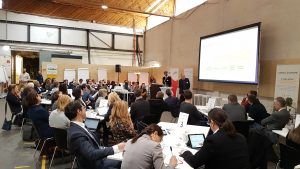
Participation at the workshop exceeded expectations. In total, there were 74 participants from 19 different countries and 39 different cities. Regarding participant categories, there was a fruitful mix of different backgrounds – representatives from cities, funding agencies, research organisations and business. Participants were welcomed by Haitze Siemers (European Commission, Directorate-General for Energy; Head of Unit New energy technologies, innovation and clean coal), Margit Noll (Chair of Management Board, JPI Urban Europe, Austrian Research Promotion Agency) and Petra Schöfmann (Expert Energy Center, Urban Innovation Vienna), who all addressed the importance of joining forces in order to achieve the ambitious and pressing goals of COP21 and the energy transition and pointed out the significant role of cities in that process. The PED Programme is seen as a valuable contribution to the efforts. See photos from the event at the bottom of this page.
The interactive workshop design was elaborated by JPI Urban Europe and the moderators Efa Doringer and Johannes Brossmann (PlanSinn GmbH) and intended to build up from sharing experiences to defining key areas of action and most pressing aspects to developing pathways and discussing of future forms of cooperation (cities network):
• Check-In: different cities, different PEDs
• The PED Programme
• Session 1: Framing the PED ambition
• Session 2: Approaching the ambition: what action is needed?
• Session 3: Finding pathways
• Session 4: Creating a cities network for PEDs
• Conclusions and next steps
To get things going, participants proved their creativity by delivering impressive results to the question:
If a PED was a living being – an animal, insect, plant or even a fantastic beast – what would it look like?
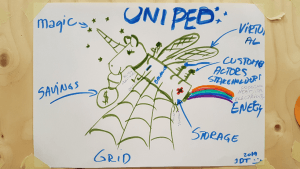
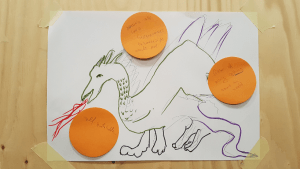
Hans-Günther Schwarz, Action Chair of the SET-Plan Action on Positive Energy Districts and Christoph Gollner, PED Programme Manager, provided an overview of background, ambitions and work plan of the PED Programme, stressing the transnational character of the initiative, the function of PEDs within the regional energy system and the need for a systemic approach toward PED implementation with cities in the driving seat. Expect results of the programme by the end of 2019: mapping of PED cases, PED framework, first joint actions, and establishment of a cities platform. Find the presentation here.
In this session’s first round, participants with different backgrounds (city representatives, funding agencies, research, etc.) were discussing their experiences in nine groups, hosted by representatives from funding agencies. The groups were then asked to note down key elements and criteria for PEDs according to the previous discussion, the notes were collected in the plenary and a “cloud” of key elements was visualized. Contributions focused on the following topics:
• Stakeholders
• Liveability
• Energy production and storage
• Planning & developing
• Operation management
• Regulations
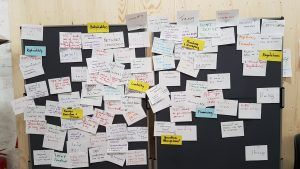
After lunch, session 2 explored actions needed in a World Café setting with 6 stations (= defined themes), hosted by the JPI Urban Europe/PED Programme team:
A plenary Mentimeter poll asked for rating the importance of the thematic fields and visualized the most pressing aspects as seen by the participants:
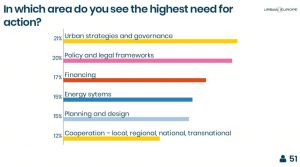
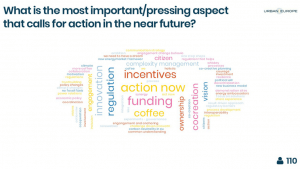
For finding pathways, participants could suggest the topics of “mini sessions” for more detailed discussion and elaboration of possible pathways. Discussions in these mini open spaces proved to be intense and fruitful.
The final session was a Fish Bowl discussion on needs and requirements for the creation of a cities platform or network. Discussions brought up the topics that have to be considered:
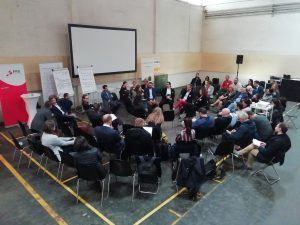
Christoph Gollner, JPI Urban Europe, Programme Manager PED Programme, christoph.gollner@ffg.at